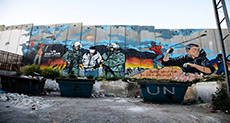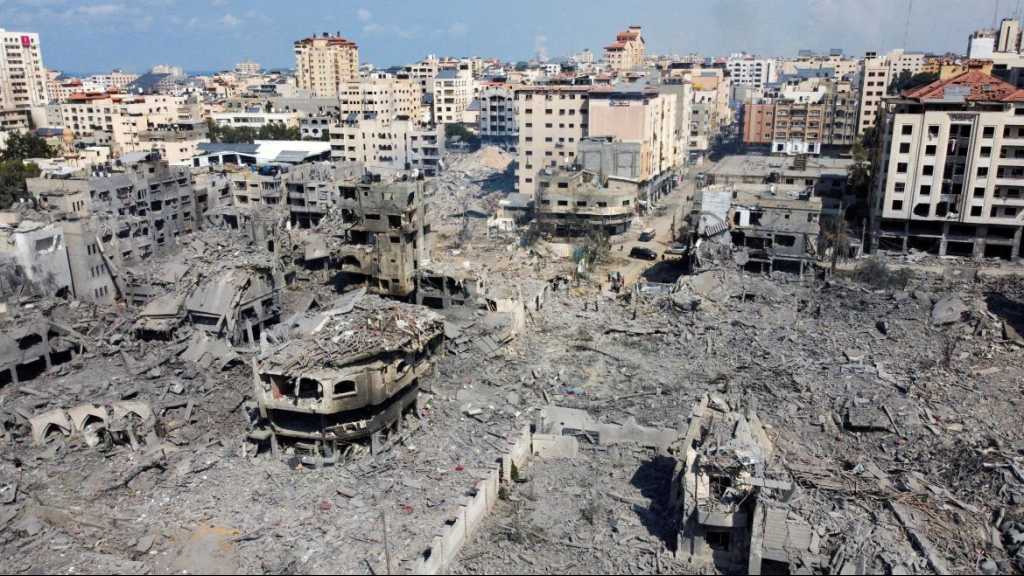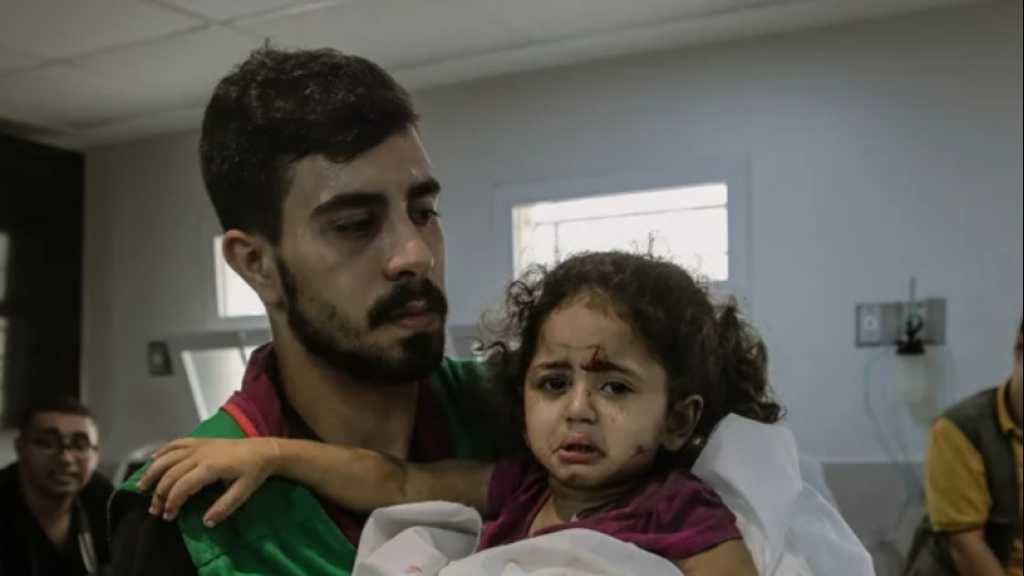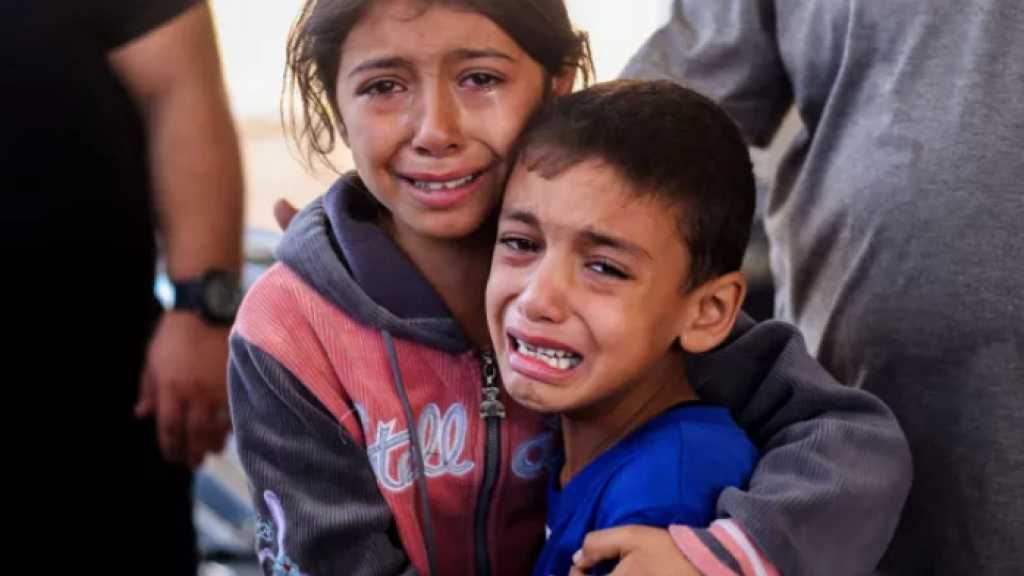
What’s Happening in Palestinian Aida Camp? Fear from «Israel» Governs Scene

Local Editor
On a chilly Monday afternoon, a group of four "Israeli" soldiers were stationed on the balcony of what is known to locals as the Cola building in Aida refugee camp's cemetery, weapons pointed at a group of five Palestinian boys, none older than 11, who were peeking from around a street corner some 50 meters away.

The scene has become a familiar one in the occupied West Bank refugee camp, as the apartheid "Israeli" army has escalated military aggression in Aida over the past several months, creating what some residents have called a perpetual "atmosphere of fear."
An ‘Almost Permanent' Army Presence
Aida, home to an estimated 5,500 Palestinians, is located in northern Bethlehem. Adjacent to the camp lies Zionist entity's separation wall.
The camp has a long history of demonstrations against "Israel", including during the 2014 war on Gaza. However, locals stated that the "Israeli" army has been noticeably stepping up its use of violence and detentions in the past two or three months.
""Israeli" forces in the last two months have secured most of the area," Salah Ajarma, the general manager of the Lajee Center in Aida, told Ma'an. "They go down [into the camp] all the time, and we didn't see that in our area before."
"[Army operations] have occurred in Aida ever since they established the [separation] wall, but lately within the last month or two, the provoking actions by soldiers have become very dangerous," Nidal al-Azza, a resident of Aida and the director of NGO BADIL, told Ma'an. "This creates an atmosphere of fear among people."
Muhammad Abu Srour, a volunteer at the Aida Youth Center, stated that soldiers deploy in a number of key areas, mostly during the night. "But even during the daytime, they shoot tear gas, rubber-coated steel bullets, and sometimes live ammunition," he said.
Ajarma said he was worried about the increased use of weapons aimed at people and homes, stating that while few locals had been injured by live fire in past months, many had been hit by ostensibly less dangerous weapons, such as rubber-coated steel bullets, or affected by tear gas.
The UN Office for the Coordination of Humanitarian Affairs said it had records of "Israeli" forces injuring at least 43 Palestinians, including 14 children, in Aida between Sept. 1 and Nov. 28.
While al-Azza confirmed that "Israeli" forces were using tear gas "every day," he noted that the army's use of floodlights in the camp also had a disruptive effect on the population.
"Lights reach inside people's homes at night -- it feels like it's daytime," he said. "You feel like they are sitting with you in your home. It's not just fear, you feel uncomfortable, like someone is watching you."
UNRWA spokesman Chris Gunness told Ma'an that the United Nations agency, which provides services to Palestinian refugees, was "worried" about the increase in the "Israeli" army's use of live ammunition, noting that it had recorded an increase in injuries and deaths caused by live fire in and around Palestinian refugee camps in 2016.
"UNRWA continues to raise this concern, as well as the profligate use of tear gas, in the densely populated Aida camp, with the relevant authorities," Gunness added. "The potential impact of the large-scale use of tear gas on the health of UNRWA staff and the camp population, particularly on vulnerable persons including pregnant women, the elderly, and children, is troubling."
Gunness also stated that ammunition fired by "Israeli" troops had landed in UNRWA's school and office in Aida "on numerous occasions."
Children Becoming Targets
What has most alarmed Aida's population, however, is the army's increased targeting of minors, as more and more young Palestinians from the camp have been detained, some as young as 12.
"Six months ago approximately, the army started arresting 16- and 17-year-old boys. Three months ago, they started arresting young children," Abu Srour recalled. "They used to arrest one or two children every two weeks or so, but recently they started arresting more children in a shorter period of time."
In October, undercover "Israeli" forces disguised as tourists beat and detained eight minors who were gathered near the Key -- the landmark gate in Aida located close to the Israeli army base.
"I was at my window when the undercover forces came out and started beating one child. I thought it was a parent who didn't want their child to be in the neighborhood because it's dangerous," Umm Muhammad, a resident of the area, recalled. "But then they started catching other children, beating two, then three. After that, [uniformed] soldiers came out of the military base very quickly."
Umm Muhammad only found out later that her 16-year-old son Muhammad and her 14-year-old nephew with special needs, Adam, had been detained in the raid. "We never expected this could happen to us," she said.
"Soldiers came dressed in civilian clothes from three different directions," Abu Srour, who witnessed the incident, said. "The kids weren't protesting or doing anything, just sitting there. The soldiers came and started beating them, throwing them against the wall, and arrested them."
Umm Muhammad said she was able to visit her son in prison for the first time on Dec. 4, nearly two months after he was detained, adding that he was doing okay, but that prison staff had rejected his request to be given glasses to address his poor eyesight.
According to Muhammad's father, the teen risks being sentenced to eight to ten months in prison and a 2,000-shekel [$525] fine for throwing stones.
Abu Srour estimated that between 30 and 35 Aida youths between the ages of 12 and 17 were imprisoned by Israel as of the end of November.
OCHA, meanwhile, said that at least 35 Palestinians had been detained in Aida between Sept. 1 and Nov. 28.
‘We're Scared'
Locals have had to adjust their daily lives as a result of the heightened army presence, as many said it had affected their freedom of movement as well as their psychological well-being.
"I live in this neighborhood [near the wall], and I used to use [the main entrance near the cemetery] to get out of the camp, but not anymore," Abu Srour said. "When I am coming back at night, I use another way because it is dangerous."
Abu Srour went on to say that the situation had affected businesses in the area, which have been forced to close during raids, and that some families had also become afraid of letting their children play in the camp's only playground due to its close proximity to the army base.
Maya al-Orzza, a legal researcher at BADIL who also lives in Aida, told Ma'an that she had stopped wearing hooded jackets at night so as not to attract the attention of soldiers, but that she had been catcalled by "Israeli" forces since. Some of her friends now abstain from lighting cigarettes outdoors in the evening, out of fear that "Israeli" forces might believe it is a Molotov cocktail, al-Orzza added.
Umm Muhammad, meanwhile, said that her other son Shadi, 15, had become withdrawn since Muhammad's detention.
"After they arrested his brother, he became someone else. He's not going to school anymore, he's afraid, he's crying, not sleeping," she said.
"We're scared for Shadi," she added, noting that he had suffered from a severe asthma attack due to tear gas exposure in September and had to stay indoors for two weeks to recover.
"Dogs have a better life than us," Umm Muhammad said. "I want to have a safe life, without threats, without troubles. I want to have a normal life."
Ajarma said that the use of undercover forces dressed as tourists had also affected the camp, which fosters close ties with the international pro-Palestinian activist community.
"It's very difficult... we host a lot of foreigners, so this breaks the trust between the local Palestinian people and the internationals," he said.
Intimidation tactics, or the beginning of a new normal?
Source: Maan, Edited by website team



